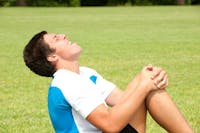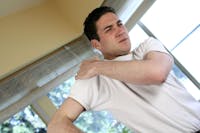By: Richard Owens PT, MS, OCS, Cert. SHT, CWcHP, Cert DN
For many people spring and summer mean one thing--time to get off of the couch and enjoy the sunshine. Many of us like to spend that time actively, whether hitting the beach for a game of volleyball, lacing up the running shoes for a jog, or cleats for a game of softball. We love to humble ourselves on one of our many golf courses, or challenge a friend in a tennis match for bragging rights. Whether it's running a marathon, or just getting out for a walk, this inherent calling to get outdoors also results in a predictable upswing in sports injuries, often caused by doing too much, too soon.
Stress fractures, shin splints, patellar and Achilles tendonitis, ITB syndrome, and rotator cuff tendonitis all seem to meteorically rise during the warmer months. These are common overuse injuries that tend to "pop-up" as we attempt to feed our recreational hunger. Sprains and strains of the ligaments and tendons of the ankle and knee, wrist and elbow are also very common sports injuries as we attempt to relive our youth and leave it all out on the field.
Over-the-counter or a medically prescribed anti-inflammatory may help some conditions while some, more involved, conditions may occasionally need an injection such as cortisone to effectively resolve. As with any treatment there is a risk of adverse reactions and even rupture in some tendons. Other conditions may respond to braces or straps to decrease tendon load and allow the body to heal on its own. Physical therapy may be ordered by your physician to assist the healing process for your return to the court or streets. While strengthening and stretching appropriately have their benefit and can play a part in the healing process, the often quoted mantra of "no pain, no gain" does not always help with these conditions and can actually worsen the condition if you play through the pain. Stress fractures need rest, typically 6 weeks to recover, possibly wearing a boot for protection. If not it could turn into a more serious issue that requires surgery.
Tennis elbow is another common summer injury. Patients feel pain on the outside of the elbow, in the muscles that extend the wrist. The counterpart to this is commonly referred to as Golfer's elbow and affects the muscles that flex the wrist and is felt along the inside of the elbow. These can plague those who participate in any of the racket sports, golf and/or weight lifting. Both conditions are the result of overuse and cumulative micro-trauma from repetitive wrist extension and flexion with more forceful activities.
Shoulders suffer in the summer, too. People are out throwing balls, both true athletes and middle-aged dads playing with their kids. Rotator cuff tendonitis and tears are common in the warmer months. Tendonitis usually responds well to anti-inflammatories and/or cortisone injections and physical therapy, while tears are usually treated by surgical repair.
Regardless of the injury, the best treatment is prevention. You can reduce the frequency of injuries by maintaining some degree of health and gradually building yourself up to 100 percent over time. For example pitchers, both young and old, should watch their pitch counts and let their arms rest sufficiently between outings. Fatigue leaves you more susceptible to lazy mechanics and increased risk of injury whereas hydration and good nutrition is key for performance and proper recovery from activities.
Runners should give their tissues enough time to recover and closely monitor their shoes for wear. Some experts recommend replacing shoes two to four times per year (depending on factors like mileage and surface), and complementing their regimen with running on soft surfaces and/or cross-training with non-impact activities, like the elliptical machine, biking and swimming.
To some degree, injuries are an unavoidable byproduct of an active lifestyle, but the advantages of being healthy and active far outweigh the risk and incidence of injury. The pull of outside sports in the spring and summer sun will always draw a crowd, as it has for generations before us and is likely to continue generations beyond. We will continue to test our metal with those around us even at the expense of nursing a sore shoulder or knee for a few weeks thereafter. Professional Rehabilitation's Services will be there to assist your recovery and get you back in the game. Our therapist will assist you with injury prevention and efficient recovery so you can get back out there and enjoy your lives.
At Professional Rehabilitation Services, we treat a wide variety of musculoskeletal conditions using the latest in evidence based therapies provided by highly credentialed physical therapists. In addition to being licensed physical therapists, our providers have additional specialty certifications and training in orthopedics, manual therapy, sports, strength and conditioning, vestibular treatment, and dry needling. For further information on this or other related topics you can contact Richard A. Owens, PT, MS, OCS, Cert. SHT, CWcHP, Cert DN at Professional Rehabilitation Services (Surfside) (843) 831-0163, Brian P. Kinmartin, PT, DPT, MTC, OCS, STC, CWcHP, Cert. DN (Pawleys Island) (843) 235-0200, Richard DeFalco, DPT, OCS, CSCS, CWcHP, Cert. DN (Myrtle Beach) (843) 839-1300. You can also visit our website at www.prsrehabservices.com where you can learn more about the company and even download a referral form for your physician to fill out. You can also call and schedule a free 15 minute consultation!


